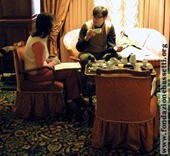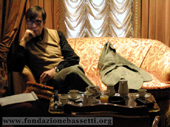Interview with Bruno Latour
by Margherita Fronte [ * ]
Bruno Latour, a French sociologist, has focused in his work on analysing the relations
between science and society, a field in which he has become one of the world’s
leading experts. On 17 November 2003, Latour, who has a large number of publications
– including We
have never been modern, Science
in Action and Politics
of Nature: How to Bring the Sciences into Democracy – to his name, gave a
lecture in Milan at the invitation of the Bassetti Foundation and the Doctoral Research
School at the Politecnico di Milano. In his lecture, Latour discussed Collective
Socio-Scientific Experiments: experiments which are no longer conducted in the laboratory
but involve wider communities and in some cases the population of the world as a whole.
 For links and further
information on the lecture, please refer to the item for 19
January 2004 in the Topics section. For links and further
information on the lecture, please refer to the item for 19
January 2004 in the Topics section.
|
What do you mean when you say that science has become a political issue?
 I mean that science is not a world of its own that can be
considered in isolation from politics. During the Renaissance, people were very aware that
the world of political debate and the world of scientific facts were closely connected. It
was only later on that the two fields came to be seen as separate, and people began to
think that there had to be one assembly in which political questions were discussed
(Parliament) and another in which scientific questions were discussed. This is how the
idea gained ground that the two assemblies should remain separate. However, if we think of
the scientific issues that are driving the debate today, such as genetically modified
organisms (GMOs) or genetic manipulation, it becomes clear that this separation no longer
works. We therefore need to return to the "Palace of Reason", a common forum
where politics and science can meet and inter-relate. I am not saying here that science
has become similar to politics. That is definitely not the case. My point is simply that
scientific and political debate should be taking place in a common space.
I mean that science is not a world of its own that can be
considered in isolation from politics. During the Renaissance, people were very aware that
the world of political debate and the world of scientific facts were closely connected. It
was only later on that the two fields came to be seen as separate, and people began to
think that there had to be one assembly in which political questions were discussed
(Parliament) and another in which scientific questions were discussed. This is how the
idea gained ground that the two assemblies should remain separate. However, if we think of
the scientific issues that are driving the debate today, such as genetically modified
organisms (GMOs) or genetic manipulation, it becomes clear that this separation no longer
works. We therefore need to return to the "Palace of Reason", a common forum
where politics and science can meet and inter-relate. I am not saying here that science
has become similar to politics. That is definitely not the case. My point is simply that
scientific and political debate should be taking place in a common space.
Can you identify any events that have helped to create such a close interconnection
between science and more general questions?
If we look back over the last few centuries we can see that when Galileo was working on
the problems of physics, he was also tackling questions of religion and state at the same
time. More generally, considerations of this nature often emerge if we consider the
history of science in a retrospective light. But there are also much more recent episodes
that show us that this is how things stand. Examples might be Chernobyl, or the debate on
the principle of precaution, or the Columbia space shuttle incident, or – in France
– the contaminated blood scandal. These are all events where it is difficult to
distinguish between issues that fall within the realm of science and issues that are part
of the political realm.
The fact that the two realms can no longer be kept separate is even more evident in
medicine, where in recent times new actors have appeared on the scene: patients’
associations. In some countries (for example the United States and France), these
organisations have become very important, to the extent that they are able to influence
not just health policy but also experimentation and the general direction being taken by
the research. This means that the people taking part in the scientific debate are also
driving the science, although they might not be aware that they are doing so. The scale of
the experiments has changed: they are no longer conducted just in the lab, but have become
collective experiments that concern each and every one of us.
If we are all involved in collective experiments, who should be deciding on the
"materials and methods" and the objectives of this research? The scientists are
somewhat reluctant to allow other people to take part in their research, but if the
experiments concern us all, should that not be happening?
Yes, it should. I don’t have an answer to this problem. What I do know is that
when we’re talking about decision-making the separation between experts and the
general public doesn’t work. I think we need to draw up specific protocols for each
individual problem. It is clear, for example, that global warming or drugs trials cannot
be tackled in the same way. One of the things I am working on at present is how to set up ad
hoc assemblies for each question. The thrust of this debate is not against scientists,
because we need to have scientists, not least because they are part of the experiment. But
for each issue we need to establish a protocol (i.e., the materials and methods used in
the relevant experimentation) that takes into account the different positions at play. And
here I mean the positions of all of us, including, for example, those that led to the
imprisonment of Bovet, who is considered to be an obscurantist, but who is doing nothing
more in his demonstrations against GMOs than discussing how a good experiment should be
conducted.
It’s clear that there is no one system that can be applied to each and every problem.
But just as the French Parliament has senators who represent the different regions, the
same should also be the case for scientific questions.
Is that what you’re referring to when you speak of a "Parliament of
Things"?
Yes.
 But what do the scientists think of all this?
But what do the scientists think of all this?
For most scientists, the idea of what science actually is has not changed in the last
century. In general, scientists have a pedagogical approach to the public, but this does
not correspond to what is actually happening in the real world. Nor does it correspond to
the type of problems that scientists themselves have to tackle throughout their career,
during which they come up against big business, or have to compete with researchers from
other countries, and so on. When you speak to them on an individual basis, they quickly
change their approach, but when they’re addressing the public, for example through
the press, they adopt this pedagogical attitude that they simply find more appropriate. If
you think about it, many politicians do the same thing.
This is also a question of communication, which leads to another consequence, that
you have underlined. You maintain that today technology is portrayed through a misleading
stereotype that tends to emphasise its benefits. To what extent are scientists responsible
for this?
They are partly responsible. It is true that scientists very often emphasise the
significance of their discoveries, maybe because a particular research project has cost
them years of effort, even before they have managed to obtain funding and then go on to
achieve concrete results. But this is just part of the reason. The tendency to portray
technology over-emphatically is indeed widespread. Nobody has yet found a way to
re-portray technology as something that has to do with the community of persons rather
than just with the world of facts. It is easier to report the results as facts and
emphasise their role. At the same time, it is usual when we are speaking of technology to
lay the emphasis on results, and indeed it is difficult to recount or portray the entire
process. This means, however, that technology is not set in context. And it also means
that we neglect the whole process of failures, fresh starts and changes of direction that
might lie behind a particular result a scientist has achieved.

(17 November 2003, published on 11 December 2003, published in English on
28 February 2004)
_________________________
[*] Margherita Fronte ( Personal page)
is a collaborator with the Giannino Bassetti Foundation
Personal page)
is a collaborator with the Giannino Bassetti Foundation
--- Back ---
 I mean that science is not a world of its own that can be
considered in isolation from politics. During the Renaissance, people were very aware that
the world of political debate and the world of scientific facts were closely connected. It
was only later on that the two fields came to be seen as separate, and people began to
think that there had to be one assembly in which political questions were discussed
(Parliament) and another in which scientific questions were discussed. This is how the
idea gained ground that the two assemblies should remain separate. However, if we think of
the scientific issues that are driving the debate today, such as genetically modified
organisms (GMOs) or genetic manipulation, it becomes clear that this separation no longer
works. We therefore need to return to the "Palace of Reason", a common forum
where politics and science can meet and inter-relate. I am not saying here that science
has become similar to politics. That is definitely not the case. My point is simply that
scientific and political debate should be taking place in a common space.
I mean that science is not a world of its own that can be
considered in isolation from politics. During the Renaissance, people were very aware that
the world of political debate and the world of scientific facts were closely connected. It
was only later on that the two fields came to be seen as separate, and people began to
think that there had to be one assembly in which political questions were discussed
(Parliament) and another in which scientific questions were discussed. This is how the
idea gained ground that the two assemblies should remain separate. However, if we think of
the scientific issues that are driving the debate today, such as genetically modified
organisms (GMOs) or genetic manipulation, it becomes clear that this separation no longer
works. We therefore need to return to the "Palace of Reason", a common forum
where politics and science can meet and inter-relate. I am not saying here that science
has become similar to politics. That is definitely not the case. My point is simply that
scientific and political debate should be taking place in a common space. But what do the scientists think of all this?
But what do the scientists think of all this?